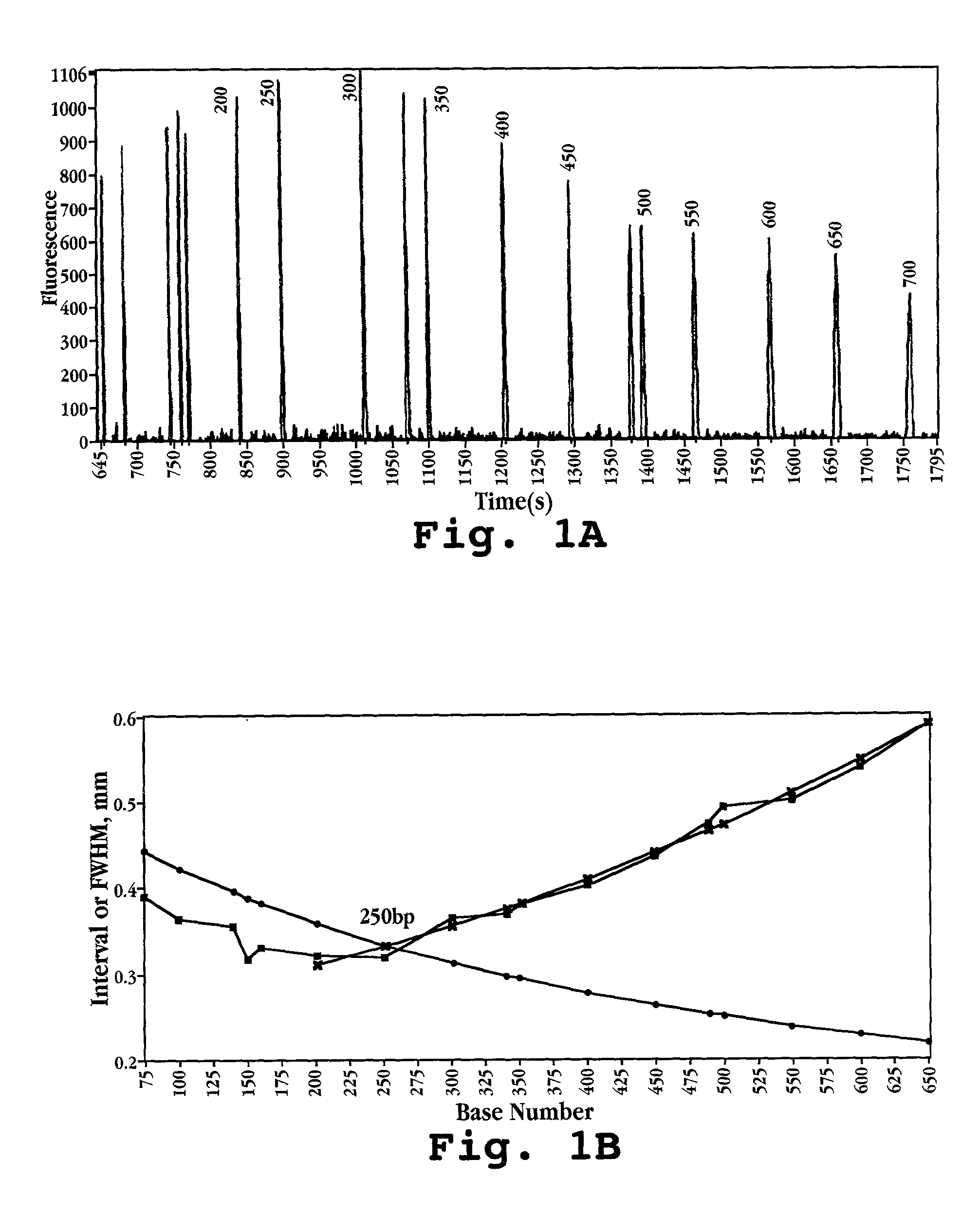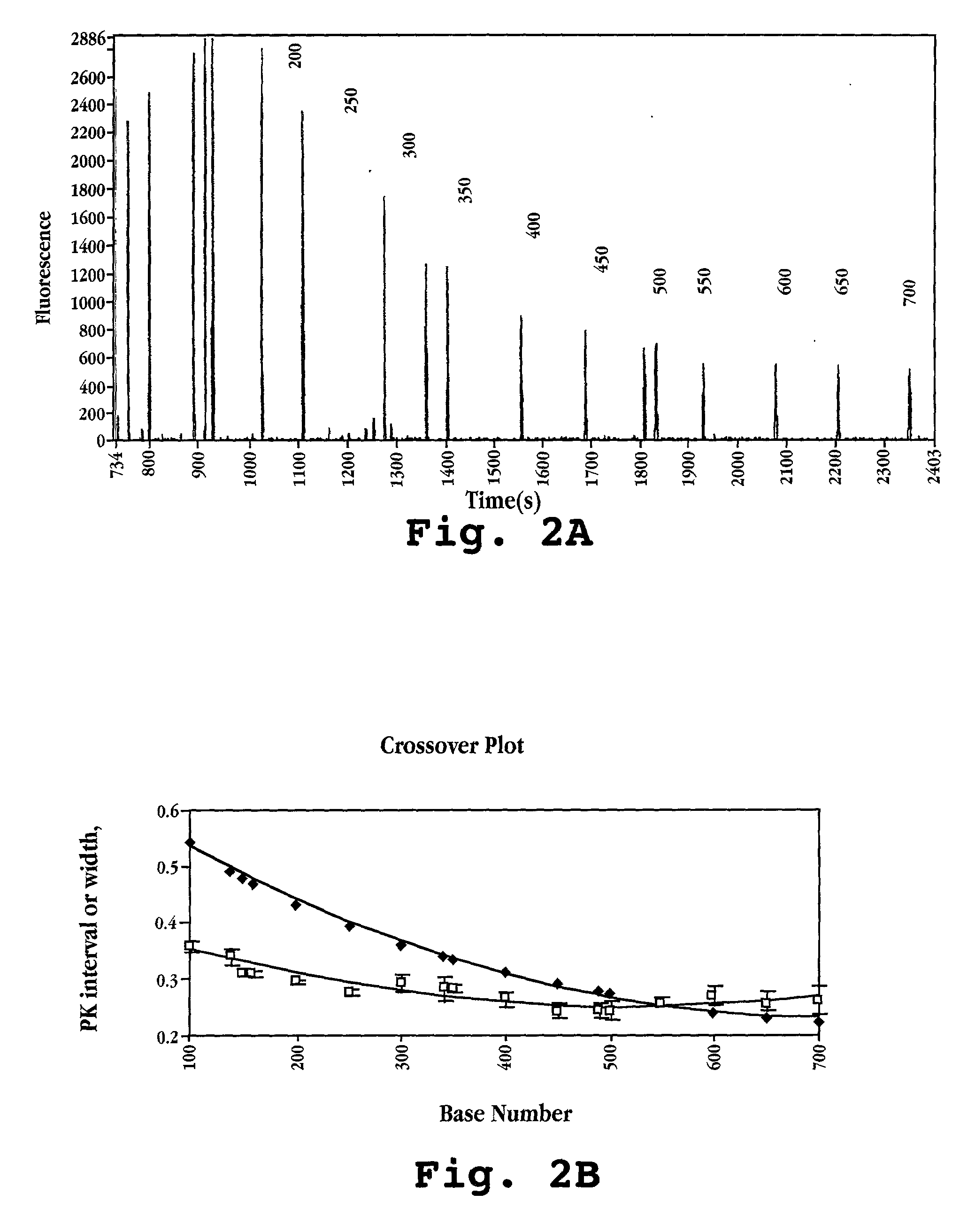Dynamic coating with linear polymer mixture for electrophoresis
a technology of linear polymer mixture and electrophoresis, which is applied in the direction of fluid pressure measurement, liquid/fluent solid measurement, peptide measurement, etc., can solve the problem of insufficient adsorption energy
- Summary
- Abstract
- Description
- Claims
- Application Information
AI Technical Summary
Problems solved by technology
Method used
Image
Examples
example 2
GeneScan 700 DNA ladder
[0046] GeneScan 700 DNA ladder is a set of specially engineered DNA fragments labeled with a fluorescent dye (TET, 6-carboxy-4,7,2',7'-tetrac-hlorofluoroscein, emission wavelength: 540 nm; excitation wavelength: 520 nm). GeneScan 700 contains 20 fragments including 35 bp, 50 bp, 75 bp, 100 bp, 139 bp, 150 bp, 160 bp, 200 bp, 250 bp, 300 bp, 340 bp, 350 bp, 400 bp, 450 bp, 490 bp, 500 bp, 550 bp, 600 bp, 650 bp, and 700 bp. Under the experimental condition used, only 18 fragments are observed which excludes 35 bp and 50 bp due to the interference of small fluorescent fragments co-migrating in this region. The loading sample is prepared with 5 .mu. GeneScan 700, 5 .mu.l deionized water, and 10 .mu.L deionized formamide. The loading sample is then denaturated at 95.degree. C. for 2 minutes before chilling in an ice bath.
example 3
Separation conditions
[0047] The sieving matrix is loaded from buffer waste reservoir (3) by applying 150 or 200 psi for 2 or 5 minutes. After being loaded with sample and buffer for the rest of the reservoirs, the whole microchip is placed on a thermal station and heated to 35.degree. C. A Peltier device thermally controls the thermal station. The four-color detection system has been disclosed in provisional patent application Ser. No. 60 / 133,727, filed May 12, 1999. The data acquisition rate is about 10 Hz while a 488 nm Ar ion laser is used with a laser power of about 7 mW. The separation field strength is about 150 V / cm. The voltage setup is listed in the following table:
1 1 3 4 Notation Buffer 2 Buffer Sample Name Well Sample Waste Waste time(s) pull 0 0 0 500 90 through relaxation 0 0 0 100 20 separation 0 310 3020 300 10000
example 4
on of LDD30 hydrophobic copolymer
[0048] The LDD30 polymer is a non-crosslinked polymer synthesized by free-radical solution polymerization. The polymerization is carried out in an aqueous solution of the monomers, diethylacrylamide and dimethylacrylamide (30:70). The total concentration of monomers is about 10% or less (w / v). The solution is de-gassed before synthesis by bubbling argon, helium, or nitrogen. Polymerization is initiated by addition of ammonium persulfate and TEMED (tetramethylethylenediamine). This solution is subjected to dialysis against purified water and freeze-drying to remove unreacted monomer and to obtain the polymer in solid form.
[0049] LDD30 is a composition defined as 30% diethylacrylamide, 70% dimethylacrylamide by weight, where the percentages are expressed as a percent of the total mass of monomers in the solution before polymerization. This composition has been found to have desirable separation and coating properties. Polymers with other ratios of the ...
PUM
| Property | Measurement | Unit |
|---|---|---|
| Fraction | aaaaa | aaaaa |
| Angle | aaaaa | aaaaa |
| Molar density | aaaaa | aaaaa |
Abstract
Description
Claims
Application Information
 Login to View More
Login to View More - R&D
- Intellectual Property
- Life Sciences
- Materials
- Tech Scout
- Unparalleled Data Quality
- Higher Quality Content
- 60% Fewer Hallucinations
Browse by: Latest US Patents, China's latest patents, Technical Efficacy Thesaurus, Application Domain, Technology Topic, Popular Technical Reports.
© 2025 PatSnap. All rights reserved.Legal|Privacy policy|Modern Slavery Act Transparency Statement|Sitemap|About US| Contact US: help@patsnap.com



